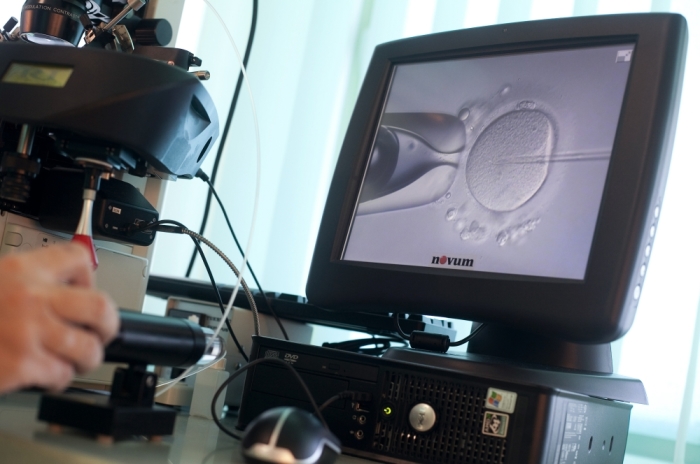Supreme Court abortion case sparks debate over how ruling may impact IVF, fertility industry

If the U.S. Supreme Court overturns Roe v. Wade in the Dobbs v. Jackson Women's Health Organization ruling by upholding Mississippi's 15-week abortion ban, some have speculated that the ruling could criminalize certain aspects of the fertility industry, particularly In Vitro Fertilization.
IVF consists of manually combining sperm and egg in a laboratory dish before transferring the embryo into a woman's uterus. Pro-life organizations such as Illinois Right to Life have warned that IVF results in the killing of unborn children in multiple ways, citing research that shows embryos often die when they're discarded or fail to survive being frozen or thawed.
Mary Szoch, director of the Center for Human Dignity for the socially conservative nonprofit Family Research Council, told The Christian Post that the IVF industry "reveals the truth that human life begins when the sperm fertilizes the egg."
"At that moment, the new human life is sacred and must be treated as such," Szoch said in an emailed response to CP. "Every human embryo should be protected regardless of where it is located because every human embryo is a human person. Destroying embryos rejects this fact."
The Center for Bioethics & Culture Network President Jennifer Lahl doesn't see a reversal of Roe as having any direct impact on the fertility industry. Lahl is also the director and producer of the 2010 "Eggsploitation" documentary, which examined abusive practices associated with the industry.
"Big Fertility is most concerned with assisting in making babies. If Roe v. Wade is overturned, I could imagine the legislative debate will happen at the individual state level, and whether states decide to include the fertility industry in their abortion laws is yet to be seen."
Earlier this month, however, Dr. Marcelle Cedars, president of the American Society for Reproductive Medicine, released a statement saying he's "very concerned" about the leaked draft opinion released in May that suggests a majority of the justices would vote to overturn Roe.
Cedar believes returning the abortion issue to the states and allowing state lawmakers to enact laws recognizing embryos as human beings could result in the banning of reproductive technologies, including IVF.
Dr. Natalie Crawford of FORA Fertility in Austin, Texas, expressed similar concerns when discussing a bill in Louisiana that would criminalize abortion and recognize that the unborn have rights at the moment of fertilization. Other states, such as Tennessee, Arkansas and Kentucky, have also enacted trigger laws that would ban abortion if Roe is overturned.
"A bill like the one that's proposed in Louisiana would prohibit IVF in that state, and that's something we're extremely worried about," Crawford told CNN last month. "We don't think people understand the repercussions from some of these proposed bills."
Elizabeth Kirk, director of the Center for Law and the Human Person at the Columbus School of Law, contends that the issue at stake in Dobbs is state-level pre-viability abortion bans, not IVF.
"If the court were to overturn the current regime of Roe and Casey, it would mean that states would have latitude to pass laws that restrict abortion — or not. It would not be a mandate to ban abortion, or contraception, or IVF, or any other practice," she told CP in an emailed statement.
"Moreover, the issue of the personhood of the preborn is not before the court, and therefore it is extremely unlikely to render a holding that requires states to protect children in utero (or ex utero)," she continued.
Kirk also noted that no laws in the existing legal regime under Roe prevent states from regulating reproductive technologies such as IVF, as the technologies "do not implicate the same concerns that pregnancy does."
"Nevertheless, most states have not chosen to do so; such technologies are notoriously unregulated," she added. "Very rarely have states passed laws protecting extra-uterine embryos and when so doing have focused on their vulnerability to intentional destruction or exploitation through research."
The Fertility Clinic Success Rate and Certification Act, which passed in 1992, requires the Centers for Disease Control and Prevention to collect and publish data about IVF, but not all clinics report their data to the CDC. The Society for Assisted Reproductive Technology (SART) and the American Society for Reproductive Medicine (ASRM) provide some regulation of fertility clinics and doctors, although, it's reportedly minimal.
As Business Insider reported in 2015, practice committees for ASRM and SART write reports about applying new procedures and treatments for reproductive technologies. Practice committees might also provide recommendations about how many embryos should be transferred per cycle depending on the age of the woman undergoing IVF.
Doctors are not required to follow these recommendations, and fertility clinics do not have to obtain approval before performing new procedures. The lack of oversight means the industry mostly regulates itself, as Business Insider reported.
Kirk stated that some states, such as Kansas, exclude ex utero embryos from protection in its fetal homicide laws to avoid having the laws apply to IVF.
"Legislators crafting proposed personhood laws will have to grapple with the complexities raised by reproductive technologies, but generally, there seems to be very little political appetite for laws restricting technologies like IVF, and this is unlikely to change if the Supreme Court declares abortion is not a fundamental right."




























